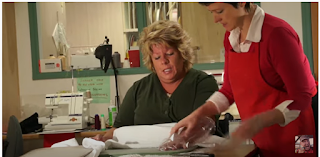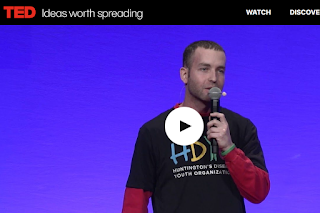Paralyzed: Guillain-Barre Syndrome
“Paralyzed:
Guillain-Barre Syndrome”
Mini Documentary
Mini Documentary
I chose to do my Neuro Note on GBS
(Guillain-Barre Syndrome) and I discovered a mini documentary, “Paralyzed:
Guillain-Barre Syndrome”. This short documentary is about a lady named Suzan
Jennings and the fear and trauma her family went through when they discovered
she had GBS—the rarest disease on earth. Before being diagnosed with GBS, Suzan
was a busy and energetic businesswoman. She had lots of friends and was very
outgoing. After taking a trip with her husband of two years, Suzan had an
emergency that landed her in the hospital. It started one morning after she
woke up and noticed her left cheek hurting. The pain then moved to her arm and
suddenly she could not move it anymore. She thought she was having a stroke and
her husband admitted her into the hospital. This is where Suzan learned that
she had GBS. Her angriest moment was in her hospital room and a nurse said to
her, “I hope you said goodbye to your husband.” The nurse was insinuating that
once Suzan’s husband realized how much of a struggle her diagnosis would be, he
would probably leave her. Although he did not leave, his role as her lover changed
to her caregiver. Many times, he felt helpless and angry and Suzan felt like dying.
She learned that GBS affects people emotionally and psychologically. Imagine
losing mostly all your physical capabilities and independence over the course
of a day! She was initially turned down by G.F. Strong Rehabilitation Center
because they felt like Suzan was too far gone; she had a severe case of GBS
that was challenging because of damage to her axons and not just the insulation
of her nerves. She was eventually accepted into the rehab program and begin to
build her strength back up. She had strong faith and persevered. Suzan had two
take-aways from her experience battling GBS: (1) life is a gift and (2) a
career is planned but sickness is dealt with. Although she will never be back to
her old self, Suzan is now an advocate for GBS and has found her purpose in
helping others going through the same things she went through. To her, GBS
stands for Getting Better Slowly.
After watching the documentary, I
visited the Centers for Disease Control and Prevention website to learn more
about GBS. I discovered that Guillan-Barre Syndrome is a rare, autoimmune
disorder in which a person’s own immune system damages the nerves, causing
muscle weakness and sometimes paralysis. Symptoms can progress over hours,
days, or weeks, and weakness typically peaks within the first two weeks after
symptoms appear. Recovery may take as little as a few weeks or as long as a few
years. GBS is rare, affecting only about 1 in 100,000 people. An estimated
3,000-6,000 people develop GBS each year in the United States. Although a rare
disease, GBS is the most common acute non-traumatic paralysis. It is also more
common in men and adults older than 50. Before watching the documentary, I had
no idea what this disease was and how it affected people. It’s really frightening
to imagine being totally independent and suddenly becoming paralyzed the next
day (without experiencing some sort of accident, like a car crash or fall). I
tried to put myself in Suzan’s shoes; if not for family and empathetic rehab
therapists, I don’t know how someone could get through this.
Centers for
Disease Control and Prevention. (2019, December 20). Guillain-barré syndrome
Retrieved August 8, 2020, from https://www.cdc.gov/campylobacter/guillain-barre.html
Lipinski, P.
(2013, October 19). Paralyzed: guillain-barre syndrome [Video]. Youtube.
https://youtu.be/zkFHjrg5zfI


Comments
Post a Comment